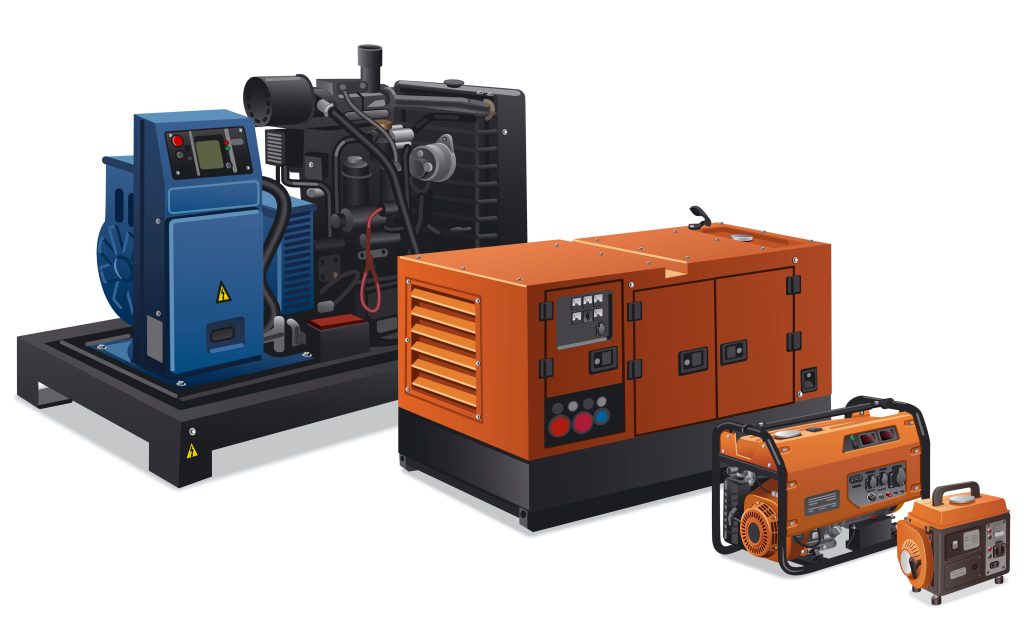Types of Generators: Your Ultimate Guide

What Are the Different Types of Generators and Their Use?
When taking a look at the types of generators available for residential use, it's a combination of considering fuel type and function. There are three primary fuel types and two main categories of function.
Fuel Types
Whether you have a small or large, portable or stationary generator, the type of fuel it uses makes a significant difference in performance and usage. Among the available fuel types, there are three main fuel types used for home generators.
Natural Gas
Among generators, the natural gas units are the most efficient and effective. Being tied into a utility line, natural gas supplies a permanent and endless fuel supply. This allows non-stop usage of your generator during any power outages without concern over running out of fuel.
Propane
Utilizing similar technology to burning natural gas, home generators can operate on propane as well. While less efficient than natural gas and relying on a tank that has to be refilled, propane generators offer backup power in remote areas where natural gas may not be available.
Diesel
Readily available and easily transported, diesel is a commonly sought after fuel for generators in rugged and off-grid communities. Diesel engines are better suited for extended use than propane and do not require finding a licensed provider to come refill your tank like with propane. They are, however, far less efficient than prone or natural gas.
Generator Types
Among the types of generators there are primarily two that homeowners rely on. Stationary, or whole-home, and portable generators. Within these categories their are varying sizes, and they can run on a variety of fuels, but at the onset of considering what generator works best for you it is a decision between the portable variety or the fixed stationary type.
Whole-Home Generators
Inside the home generator market, there are a number of different generator manufacturers competing to be considered the best. Cummins, Kohler, Generac, and others vie for that coveted 'best home generators' title. Consequently, there are a number of formidable brands to choose from if you decide a fixed home generator is what you need.
Stationary standby generators come with several advantages. As commonsense would dictate, the bigger the generator is the more power it produces. This is the main difference between a smaller, portable generator and a larger, whole-home generator. The fixed whole-home generators you can purchase are capable of powering your entire house while a portable will be limited to a few appliances. But their are a few drawbacks.
Pros of Whole-Home Generators
- Larger, able to power your entire home
- Automatically switches on when the power goes out
- Performs weekly tests to keep itself in working order and to detect issues
Cons of Whole-Home Generators
- Requires professional installation
- Cannot travel
- Disproportionately expensive compared to other options
Portable Generators
Ostensibly designed for the same purpose as a whole-home generator to provide power to your home, portable generator's practical usage and abilities are drastically different. Substantially cheaper, they also cannot come near what a stationary generator can in terms of power output. These differences and others set portable generators apart with an entirely different set of pros and cons.
Pro of Portable Generators
- Smaller, able to travel
- Very affordable
- No installation or professional services required
Cons of Portable Generators
- Limited power output, usually only able to run an appliance or two
- Requires manual startup and testing
- Heavy, often difficult to move where you need it
Which Generator Type is Best?
There isn't a 'best' when it comes to selecting types of generators. Among the various fuels and in comparing portable to stationary, it becomes less a question of which is best and more a question of which is best for you.
Budget, installation location, and desired usage make the difference in deciding which generator you should purchase. Taking a minute to review and consider the pros and cons of each can help make clear the answer to which variety is right for you. Are you looking to live off-grid? A fixed diesel generator is probably right. Do you have a limited budget and just want to be able to keep your refrigerator cold and use your stove during a power outage? Then a portable is likely a good choice. Does your budget allow you to experience the safety and comfort of guaranteed endless power through a natural gas whole-home generator? Well then of course that's the one you should purchase.
What isn't a question is whether or not you should be considering a generator. With increasing threats to our power grid and year-over-year worsening storm seasons, having a backup power solution only makes sense. Whether as part of your hurricane preparedness or simply for the sake of comfort, getting a home generator is a smart decision to make.
Need Help Deciding What Generator You Need?
Our team of generator expert can help you determine the type and size generator you need. We'll take the time to discuss your goals and requirements for backup power and make recommendations accordingly.